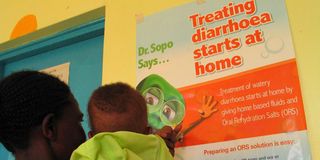Revealed: At least 30,000 children die from diarrheal diseases yearly

A woman reads a poster on diarrhoea at Nyeri County Hospital
Diarrheal diseases are the second cause of mortality and morbidity among children five years and below in Kenya.
According to the former director of health services at Nairobi Metropolitan Services, Dr Ouma Oluga, diarrheal diseases are among the top three killers of children in Nairobi.
Every year, "almost 30,000 children die across the nation; 8,000 to 9,000 of those deaths occur in Nairobi alone due to illnesses from dirty drinking water," the man claimed.
Dr Oluga spoke at Kibera Level 3 Hospital, where a solar-powered water desalination plant was installed to provide the facility with clean water.
The hospital now has clean water for drinking and other medical uses.
Dr Oluga estimates that diarrheal illnesses are some of the opportunistic infections that persons with HIV contract.
The plant was set up at the facility in collaboration with Boreal Light, the German government, DEG (a German corporation), and WaterKiosk, a new Nairobi-based company.
When the Covid-19 pandemic was at its worst in 2020, the project was started to provide hospitals with safe drinking water.
Diarrhoea can last several days and leave the body without the water and salts necessary for survival.
Also Read: Cholera outbreak hits Eastleigh
According to the World Health Organization, in the past, for most people, severe dehydration and fluid loss were the main causes of diarrhoea deaths. Other causes, such as septic bacterial infections, are likely to account for an increasing proportion of all diarrhoea-associated deaths.
Three or more loose or watery stools per day are considered diarrhoea (or more frequent than normal for the individual). Diarrhoea is not the frequent passing of formed stools or the passing of loose, "pasty" stools by breastfeeding infants.
Diarrhoea is a sign of an intestinal illness, which can be brought on by a number of bacterial, viral, and parasitic organisms. Due to inadequate cleanliness, infections can also spread from person to person through tainted food or drinking water.





